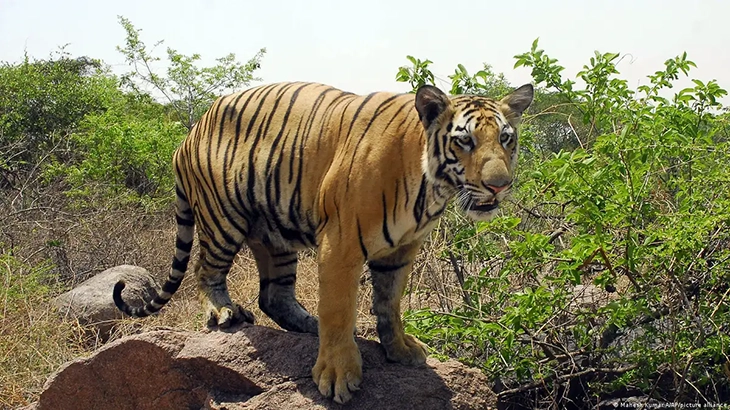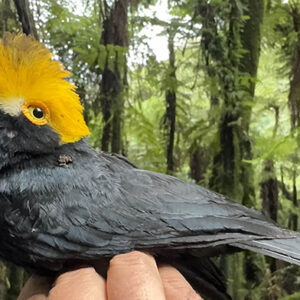
Two young men from Kerala are reshaping the landscape of wildlife conservation in India by leveraging their software and programming expertise. Rather than pursuing traditional paths in the tech sector, they are pioneering the integration of advanced digital tools to revolutionize the country’s approach to tracking, preventing, and prosecuting wildlife crime.
Their innovative suite of apps and tools represents a quantum leap forward in digitizing wildlife conservation efforts. By harnessing technology, they are empowering courts to swiftly adjudicate wildlife crime cases, enabling rangers to analyze and track criminal activities in forests with unprecedented efficiency, and introducing numerous other enhancements to conservation practices.
In many parts of the world, including India, reliance on antiquated paper records painstakingly written by hand or committed to memory is the norm for ranger teams and wildlife crime prosecutors. However, these young innovators are challenging this status quo by ushering in a new era of data management and analysis that promises to significantly bolster the effectiveness of conservation efforts.
“I realized how there is a gap in the market. There is almost zero technology to track any kind of wildlife crime in India,” said Allen Shaji. He is the co-founder of Leopard Tech Labs. “Working with the Wildlife Trust of India and with their support, our company was able to make HAWK or ‘Hostile Activity Watch Kernel’ with the forest department of Kerala,” he shared.
Leopard Tech Labs, in collaboration with his college companion and co-founder Sobin Matthew, crafted four distinctive software solutions currently utilized by the Kerala Forest Department: Cyber HAWK, SARPA (Snake Awareness, Rescue, and Protection App), Jumbo Radar, and WildWatch.
“HAWK is an offense management system that includes case handling, court case monitoring, communication management, and wildlife death monitoring,” Allen told The Better India, as he elaborated that before this, all casework had been done on paper. Now, HAWK has the ability to immediately summarize large amounts of data into different kinds of digital documents, such as a Google spreadsheet, PDF, Microsoft Excel, etc.
HAWK’s lightning-fast data processing capabilities revolutionize the accessibility of real-time information during critical sessions in courtrooms or parliament chambers. Whether it’s crunching numbers on the alarming increase in elephant deaths year over year or analyzing a detailed police report from a wildlife crime scene, HAWK delivers instantaneous insights.
Moreover, HAWK isn’t solely the domain of governmental authorities; it serves as a repository for vast datasets contributed by the International Union for Conservation of Nature (IUCN), the globe’s foremost wildlife conservation organization. This collaboration ensures that HAWK not only aids law enforcement but also leverages the collective knowledge of conservation experts, enriching its utility and impact.

Jumbo Radar, alongside the existing HAWK system, furnishes India’s forest departments with a comprehensive toolset for monitoring elephant movements beyond nature reserves in real-time. This capability is pivotal in preemptively addressing potential human-elephant conflicts. Complementing these efforts, WildWatch leverages advanced machine learning algorithms to forecast instances of such conflicts before they escalate.
WildWatch’s predictive prowess stems from its multifaceted analysis of various parameters. It factors in the seasonal migrations of wildlife, historical data on wildlife aggression, and agricultural metrics such as crop coverage, proximity to protected areas, and the timing of human activities near crop boundaries. By synthesizing this wealth of information, WildWatch anticipates conflict zones before they materialize, enabling proactive interventions to mitigate human-wildlife clashes.
“This information allows for targeted interventions, such as advising villagers to relocate or alter crop cultivation practices, thereby mitigating conflicts and promoting coexistence,” Allen said.
Leopard Tech Labs’ innovative products have swiftly transcended the borders of Kerala, making inroads into Tamil Nadu, while also garnering attention from wildlife reserves. Three tiger reserves have embraced their comprehensive suite of solutions, marking a significant step in conservation efforts. Moreover, the company’s reach extends beyond India, with the development of an application tailored for Brazil. This app aims to mitigate the perilous human-snake conflict, showcasing Leopard Tech’s commitment to addressing global conservation challenges.
The gravity of wildlife trafficking cannot be overstated, ranking as the third most profitable illicit trade worldwide. Nations lacking stringent enforcement of environmental regulations are at risk of becoming breeding grounds for poaching activities that extend far beyond iconic species like elephants and rhinos. It underscores the urgent need for robust measures to combat illegal wildlife trade and safeguard biodiversity on a global scale.
What are your thoughts? Please comment below and share this news!
True Activist / Report a typo


